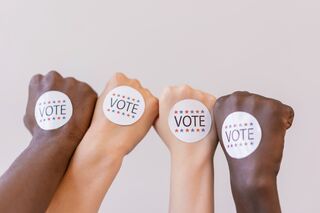Stress
How to Cope With Midterm Election Stress
Strategies for enduring the midterms before and after the results are in.
Posted October 26, 2022 Reviewed by Vanessa Lancaster
Key points
- Regardless of party affiliation, 71% of voters believe that democracy is at risk, making the stakes of the upcoming midterms feel very high.
- Studies have shown that political stress, like any other form, can have harmful consequences for physical and emotional well-being.
- Strategies for coping include controlling how much news and ads you watch and engaging in mindfulness practices.

A recent APA survey reported that more than three-quarters of U.S. adults say the future of our nation is a significant source of stress in their lives. More than a quarter are so stressed they can’t function, and 66 percent of that group cites the current political climate.
This likely doesn’t come as a surprise. A political ad I saw last night insisted that if I voted for a particular candidate, I’d be making “a deadly mistake.” I awoke this morning to 44 political ads in my inbox and then turned on a morning talk show to hear the commentators lament that people are not signing up to be poll watchers because they’re afraid of the potential for violence. And then they went to a commercial break in which there were a series of commercials, each one more alarmist than the next.
At a time when 71 percent of all voters, regardless of political affiliation, believe that democracy is at risk, the stakes feel very high.
The present-day political climate is ripe for a stress response. An unpredictable future and not feeling in control are the seeds of an anxiety response, which often leads to a feeling of overwhelm.
Our brains shut down once we’re overwhelmed, and thinking becomes more difficult. The continuous bombardment of stimuli–lawn signs, phone calls, text messages, advertisements, and news–creates a cycle in which anxiety leads to overwhelm, which leads to a greater vulnerability to the emotional content of the advertisements, which in turn creates more anxiety.
Studies have shown that political stress, like any other stress, can have deleterious consequences for both physical and emotional well-being. We need to cope with today’s politically induced stress as well as tomorrow’s.
Strategies for coping include:
- Control your ingestion of political ads. Turn the volume off or walk out of the room and take a bathroom break.
- Control how much news you are watching.
- Take walks in nature. Psycho-physiological restorative responses have been noted in studies that look at people’s reactions to natural surroundings.
- Listen to music. Reductions in respiration rates, skin conductance, and muscle tension have all been reported when research subjects are monitored while listening to music.
- Engage in mindfulness practice. The emotional and physical benefits of meditation are well known. They include: gaining a new perspective, increasing self-awareness, focusing on the present, reducing negative emotions, and increasing patience and tolerance.
Research shows that elections may be even more stressful after the fact for voters whose party loses. Both stressor forecasting — the anticipation that stressors are likely to occur in a defined future — and an anticipatory coping response have been shown to be effective coping strategies.
Some strategies for anticipatory coping are:
- Plan a response if your candidate loses. As an example, continue to be, or become, active in creating positive change for the issues you care most about.
- Try to reduce a partisan mindset in which you see only the other party’s danger. Understand that this mindset makes you overly aware of the perils of the other side while not noting the weaknesses that your party may bring.
- Disrupt the “What if” negative loop. People uncomfortable with uncertainty often want to use their intellect to solve problems. Around and around they go, digging a deeper and deeper hole as they keep trying to solve the unsolvable, for example, the unknown future. Limit yourself to three cycles of “What if…” and then distract yourself with one of the current means of coping listed above.
Political campaigns are wars of words and images that lead to physiological and psychological stress on the electorate. It is important that people protect themselves from falling into a state of distress and overwhelm so that they can think clearly during these stressful days. And most importantly, vote.
Voting is not just a means of expression. It is also a way in which you assert some control.
References
Stress in America 2022. American Psychological Association, October 19, 2022.
Cross-Tabs for October 2022 Times/Siena Poll of Registered Voters. The Upshot, The New York Times, October 18, 2022
Baum-Baicker, C. (2020) Not fake news: Toxic consequences of the Trump stress effect. Journal of Humanistic Psychology, 60 (6), 730-746. https://doi.org/10.1177/0022167820911757
Neupert, S.D. and Bellingtier, J.A. (2019). Daily stressor forecasts and anticipatory coping: Age differences in dynamic, domain-specific processes. The Journals of Gerontology: Series B, 74, 17-28. https://doi.org/10,1093/geronb/gyb043
Han, K-T. (2007) Responses to six major terrestrial biomes in terms of scenic beauty, preference, and restorativeness. Environment and Behavior 39 (4), 529-556.
Omigie, D; Frieler, K; Bar, C; Muralikrishnan, R.; Wald-Fuhrmann, Fischinger, T. (2019). Experiencing musical beauty: Emotional subtypes and their physiological and musico-acoustic correlates. Psychology of Aesthetics, Creativity, and the Arts. Sept 09, 2019.


